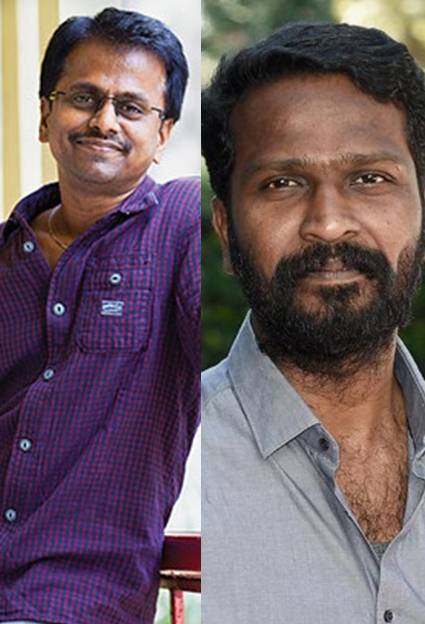
What differentiates a repetitive filmmaker from an auteur.
Filmmakers and scenarists have their own set of visual cues and story beats that tends to get repeated in their work quite often. There are many instances of repetition in Tamil cinema that are often parodied (refer C.S Amudhan's films). Some examples include Mysskin's love for ground-level shots, coupled with excessive movement of the characters and the usage of the phrase "I am waiting" in the interval block of every post-Thuppakki A.R Murugadoss film that stars Vijay in the lead role. The latter trademark might appear to be a self referential shoutout to their earlier film where the magic created by these touches are harmonious and do not come across as a force-fed moment. Certain stamps of the creator exist to give a distinct visual style, thereby differentiating themselves from the rest in terms of presentation.
But despite the recurrent use of themes and trademark moments, some filmmakers use them to create a distinct body of work. One such example is the work of Tamil filmmaker Vetrimaaran, whose films have a strong sense of continuum with his earlier works, thereby creating a universe within them. In Vetrimaaran’s 2018 gangster epic Vada Chennai, the themes of betrayal (the pre interval twist) mentor-protege relationship (the bond between Anbu, the protagonist and Thambi / Guna ) are presented in the film. These themes appeared in his earlier works, and one of the reasons for the recurrence might be attributed to the fact that the dense, thousand page story Bible of Vada Chennai (a film that should’ve been the director’s debut) were sources of inspiration for his other films. But the beauty lies in the fact that Vetrimaaran could ground such themes in milieus that are poles apart. When Polladhavan was based on an urban area like North Chennai, his second feature, Aadukalam was based on illegal cockfighting matches in Madurai. His third, and probably his most underrated work, Visaranai was based on a novel ‘Lock up’ by Chandran Kumar.
Vetrimaaran lets the characters grow apart in an organic fashion, caused either by the jealousy brewing between them or due to an obligation from a higher authority. In Visaranai, the betrayal of the loyal protagonist and his companions by the policemen are underplayed and comes across as mere collateral damage, whereas the same emotion is presented in an operatic manner as a double cross with dramatic use of slow motions and heavily scored music in Vada Chennai. The character arcs and the narrative structure that leads to betrayal are different in every film, thereby enabling the filmmaker to even reimagine a recurring theme as a surprising twist in the latter. The payoff is achieved through elaborate psychological pushes, which was shown masterfully in Aadukalam, (where the mentor slowly becomes envious of his protege’s success) or in a rather generic fashion in his debut film, Polladhavan.
When mainstream filmmakers imitate themselves in an attempt to rework their previous success, the success of a filmmaker like Vetrimaaran shows that these repetitions can be invisible only when the emotions behind them are universal in nature. I am already expecting some 'You too Brutus' moments (Vetrimaaran is a also a self-confessed Shakespeare fan) in his next venture, Asuran. Or will the maker spring a surprise.
Behindwoods is not responsible for the views of columnists.
OTHER LATEST BEHINDWOODS COLUMNS
ARAVIND'S OTHER COLUMNS
RELATED LINKS
- Vada Chennai | Messages that 2018 films gave us - Slideshow
- Vada Chennai | 10 Best Tamil Movies of 2018 - Slideshow
- Vada Chennai | Top 10 Highest Footfall of 2018 - Rohini Theatres' official list - Slideshow
- Vada Chennai | Vettri Theatre's top 10 films of 2018 - Slideshow
- Vada Chennai | 9 upcoming Aishwarya Rajesh films | CCV, Dhruva Natchathiram and more - Slideshow
- Vada Chennai | List of movies spoofed in Tamizh Padam 2 movie - Part 2 - Slideshow
- Vada Chennai | Tentative list of Tamil movies to release in the second half of 2018 - Slideshow
- Vada Chennai- Photos
- Vetri Maaran-Dhanush film | Complete list of Dhanush's upcoming films - Slideshow
- OFFICIAL: Dhanush Reveals his Next Movie with Vetrimaaran! | TK
- Andrea அண்ணி" - Daniel Balaji Funny Speech | Vada Chennai | Dhanush | Aishwarya Rajesh | TN
- VADACHENNAI - Official Teaser Reaction | Dhanush | Vetri Maaran | Santhosh Narayanan
- Director Vetri Maaran | Ram's Peranbu Celebrities Review - Slideshow
- Dhanush’s Adorable Message For Son Linga
- Is THALAPATHY 63 - A Vetri Maaran Film? - Clarifications





